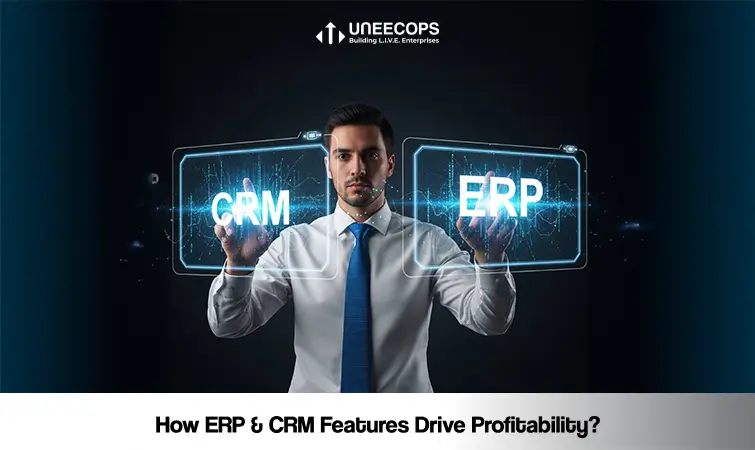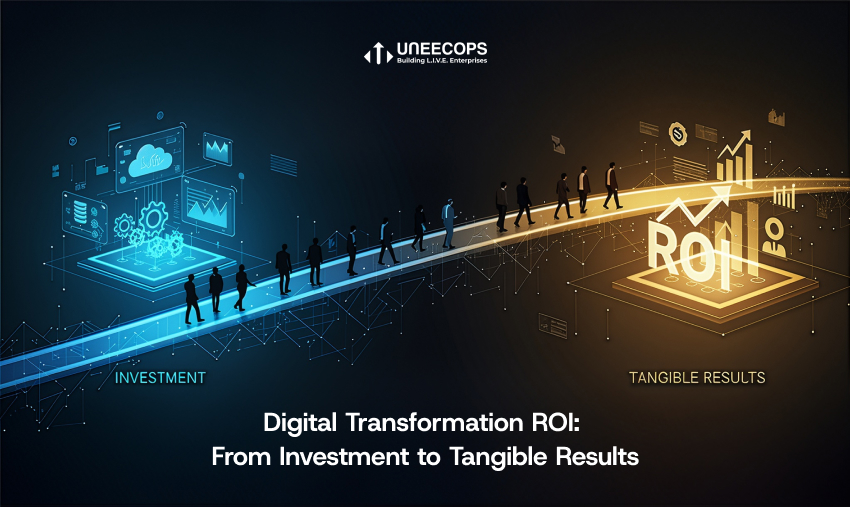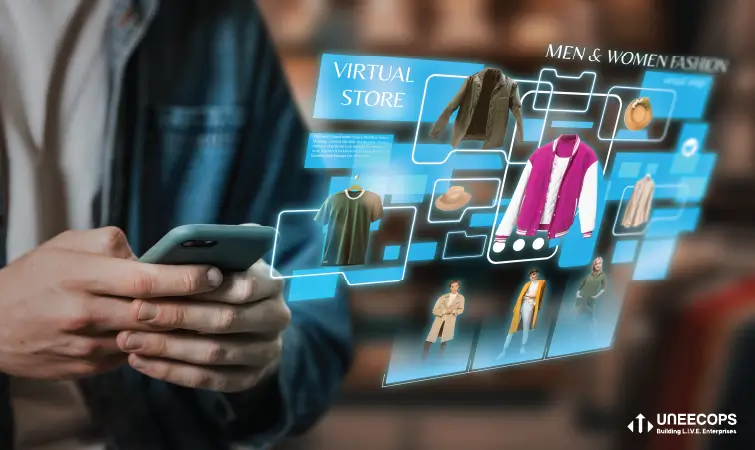Two powerful systems, one crucial decision. Which way will you go—ERP or CRM or Both?
Scaling up your business? ERP streamlines, CRM sells—what’s your first move?
Well, definitely the decision is tough but before that having clarity on the features and applicability of both the systems is important.
CRM systems help businesses manage customer relationships, while ERP systems help businesses manage all aspects of their operations. Having the best of both the worlds of CRM and ERP software are unavoidable part of a modern business. However, knowing the difference between ERP and CRM helps understand the actual use cases and feasibility of ERP vs. CRM for a business.
ERP software solutions cater more to handling integral processes such as accounting, financing, and inventory management for a business. Meanwhile, CRM software solutions have more specific usage, especially in managing customer interactions, launching personalized campaigns, tracking sales, and much more.
By the end of this article, you will have an understanding of when to use what as we will analyze and understand the key features of both CRM and ERP software.
From Mess to Mastery: How ERP Transforms Businesses
ERP software solutions are powerful business management software that plays a major role in helping businesses with a lot of key tasks. Such solutions provide a centralized system to get real-time access to synced data from all departments.
ERP software solutions also feature advanced automation capabilities, using which various mundane and repetitive tasks can be automated with precision. It is an all-in-one product that streamlines business operations by providing a single solution for managing multiple tasks, such as financial reporting, inventory management, and making data-driven decisions.
Companies in heavy production sectors such as manufacturing or even healthcare cannot afford to miss out on having advanced ERP software solutions to carry through their daily operations. Every industry uses ERP software solutions for different purposes. For example, the manufacturers rely heavily on the inventory managing capabilities that ERP offers. Meanwhile, companies in the retail industry may use it for data insights and analysis.
ERP software solutions such as SAP, Oracle ERP, Odoo ERP, Sage, and NetSuite ERP are in high demand across the globe. Today, operating a business without the help of ERP software is quite underwhelming.
From Leads to Repeat Customers: How CRM Changes the Game
Customers and clients are inevitable parts of every organization. Serving customers, retaining them, and maintaining long-term relationships with them is something non-negotiable for every organization in any industry. To better manage and understand customer or client information CRM software solutions are the perfect pick for businesses They aid businesses in managing everything related to customers and marketing. They help businesses to accurately gather data from customers and then analyze it with precision.
CRM software solutions also feature advanced marketing tools that use this data to churn out highly personalized marketing campaigns. There is no doubt that CRM software solutions boost customer satisfaction and help scale the business to greater heights.
CRM tech also plays an important role in the sales department. It streamlines the whole process to accurately track and store new leads without any discrepancies. Businesses will be able to run targeted marketing campaigns due to the customer segmentation features of the CRM software.
Major CRM software solutions providers that offer advanced tools and add-ons to boost customer feedback and accurately track leads in real-time, include Salesforce, HubSpot CRM, Freshsales, Pipedrive, monday CRM
ERP or CRM – Where Should Your Business Invest First?
Many companies use ERP software, but they may require a CRM system depending on their business requirements. In addition to ERP systems, company leaders should assess whether an organization will benefit from purchasing CRM software. The size of the company, the company’s strategic goals, and data needs usually affect whether or not it should invest in both CRM and its ERP systems.
There is no direct clash between ERP and CRM; both of these software solutions are required for businesses to grow and sustain themselves. Therefore, knowing the difference between CRM and ERP software is highly beneficial, as it is all about the proper distribution of resources and goals. So, instead of treating it as ERP vs CRM, we will solely take a look at the similar and diverse features of the CRM and ERP software.
| ERP vs CRM Differences at a Glance | ||
| Purpose | To improve relationships with customers and leads | To provide a unified system for internal business operations |
| Key Functionalities | Contact and lead management Multiple sales pipeline Workflow Automation Reporting and Analytics App integrations | Centralized database for all departments Process automation Enhanced production visibility and tracking Supply chain management Financial management |
| Data Processed | Customer data preferences and purchase history | Financial reports, production, and inventory data |
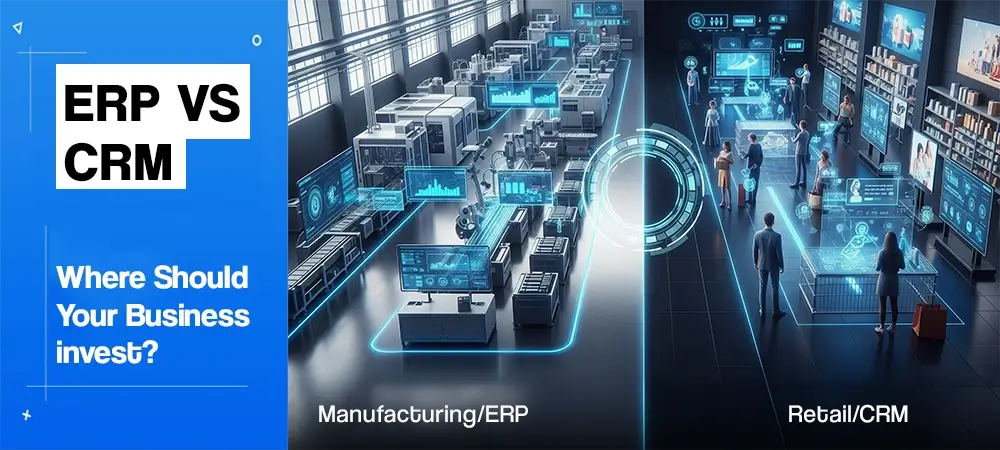
Beyond Software: How ERP & CRM Features Drive Profitability
ERP is a software framework with features ranging from managing inventory, integrating third-party apps/software, accessing real-time feedback for better decision-making, and bringing all operational activities of different departments like finance, human resources, sales and marketing, supply chain, and logistics under a single interface. Businesses use ERP to streamline their production processes and reduce operational gaps and bottlenecks if any.
CRM, on the other hand, provides more specialized features catering to customer management, pipeline management, user management, access control, team collaboration, sales tracking, data management, field sales management, lead management, and process automation. Businesses use it to improve their customer retention rates and improve the efficiency of their marketing tactics.
CRM Module in ERP – Why the Future of CRM Lies Within ERP Systems?
A CRM module in ERP integrates customer management with the central business processes. This drastically improves the data flow and accuracy between them. CRM module in ERP is highly beneficial for businesses because it centralizes every process and data flow into a single interface. It makes managing all aspects of business, ranging from customer relationships to financial reporting, much easier.
Having a centralized dashboard also improves the efficiency of various departments as now they have access to the same datasets from the entire workflow. And, it is now getting more common for CRM providers to include a CRM module in ERP. All major providers such as SAP or Oracle offer a CRM module in ERP for better production outcomes and higher efficiency.
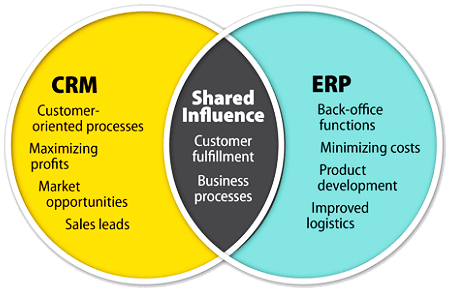
Different Systems with Common Goals
The CRM vs. ERP Dilemma: How to Choose from the Best of Both Worlds for Maximum ROI
The ERP vs CRM debate gets more intense when deciding to pick from either of them. Businesses need to do a deep evaluation of their objectives and business goals before choosing between CRM and ERP software. Factors such as industry type, challenges, and budgeting should be kept in mind for better decision-making.
As mentioned earlier, CRM focuses solely on the customer, sales, and marketing side of things. Meanwhile, ERP is more concerned with core business functions like supply chain, production, procurement, and operations. Businesses that have requirements for both CRM and ERP can go for a CRM module in ERP. Such a module provides access to both the CRM and ERP software in a single centralized dashboard. This article covered key components of the ERP vs CRM dilemma. Both the CRM and ERP software provide diverse and distinct features that sometimes overlap.
Companies need to have a proper strategy and clarity on their business goals to pick one from the CRM and ERP software. Nowadays, all major ERP providers include a CRM module in ERP to end this ERP vs CRM confusion by providing the features of both into a single product, yet sometimes you need a professional expert to guide you in laying a personalized roadmap of ERP and CRM strategy.
Uneecops’ longstanding partnership with leading technology platforms enables it to deliver curated digital transformation services depending on the business requirements. Our diverse network of technology experts and consultants ensures that your business receives the most innovative and customized enterprise IT solutions. Whether your business model is at risk of disruption or you want to elevate your enterprise, a team of Uneecops helps you reengineer your business processes to extract the maximum technological benefit and keep you agile.
As an ERP solutions company, we leverage industry, intelligence, and innovation to drive enterprise transformation. Building the intelligent enterprise of tomorrow or streamlining routine operations, SAP-integrated ERP software solutions by Uneecops can help achieve reliability, accelerate ROI, and deliver lean operations. Also, as a Salesforce+ Tableau consulting partner, Uneecops delivers cutting-edge CX solutions and services to help you provide a better customer experience. Led by CRM Salesforce experts, our commitment to delivering CRM solutions goes beyond achieving goals.
Talk to Our Experts & Make the Right ERP vs. CRM Decision!



